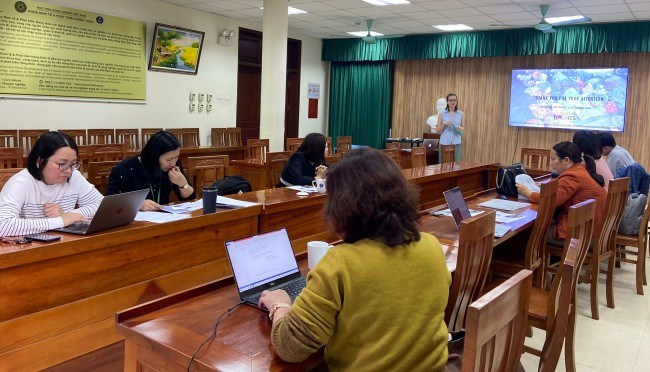Within the framework of scientific research cooperation and academic exchange between Vietnam National University of Agriculture (VNUA) and UCLouvain University, Belgium, on the morning of March 14, 2023 at room 405, Administration house, the Agricultural Policy Research Group, Faculty of Economics and Rural Development, VNUA, held a seminar entitled “Better together? The effect of Vietgap and PGS certifications on farmers’ welfare in Vietnam” presented by PhD student Laura Enthoven from UCLouvain University, Belgium.
Attending the seminar were Assoc. Prof. Dr. Nguyen Phuong Le, Head of the Department of Agricultural Economics and Policy, Faculty of Economics and Rural Development, VNUA; Dr. Le Thi Thanh Loan, Leader of the Agricultural Policy Research Group, Faculty of Economics and Rural Development, VNUA and a large number of faculty’s staff, lecturers, and researchers as well as students from the Agricultural Economics Class taught in English.

PhD student Laure Enthoven, UCLouvain University presents at the seminar
In recent years, research on safe vegetable production according to VIETGAP, GLOBALGAP, Organic, PGS (Participatory Guarantee System) standards has been carried out by a number of Vietnamese and international scholars, but most of the findings have only focused on evaluating each farming technique individually and its impact on the economic efficiency of vegetable producers in Vietnam. The presentation by PhD student Laure Enthoven aimed to identify the factors affecting the simultaneous participation of Vietgap and PGS, and analyze the effects of participating in safe vegetable production according to those standards on income and market access of vegetable producing households in Hanoi.
The study conducted a survey of time series data (Panel Data) in 2018 (when the PGS safe vegetable production project started to be implemented) and 2022 (immediately after the project ended) on 222 households producing safe vegetables in 3 districts, namely Chuong My, Gia Lam and Thanh Tri in Hanoi. The data were analyzed using the Conditional Logit Model and the Correlated Random Effects Model.
In the presentation, PhD student Laure Enthoven pointed out that the factors such as gender, education, dependency ratio and land size affected participation in safe vegetable production according to Vietgap and PGS standards. However, the selection of project areas for safe vegetable production in some localities in Hanoi according to the top-down mechanism led to many influencing factors that were not explained in the model. Participating in the PGS vegetable production project brought about many benefits to farmers such as strengthening the capacity of community supervision in vegetable production, helping farmers to better grasp production techniques, and, at the same time, increasing their ability to market access in large supermarkets. However, the research results showed that the project had not improved the income of households in the project area, which was still a matter of debate among local authorities, farmers and project implementation agencies.

Members of the Agricultural Policy Research Group and the presenting scholar take a photo.
In addition, in the seminar, there were many questions related to safe vegetable production, the selection of research sites and the determination of some indicators and calculation tools raised by lecturers, researchers and students, which enabled a lively discussion.
The seminar was held successfully, providing useful academic knowledge on the benefits of safe vegetable production standards to the income and welfare of farmers in Vietnam.